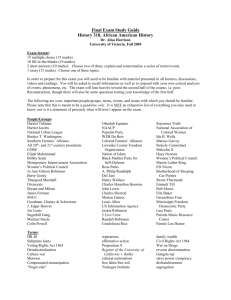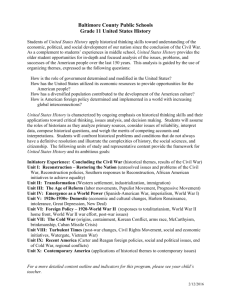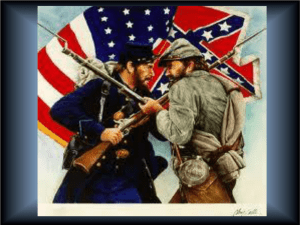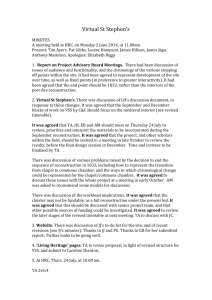The Failure of Reconstruction
advertisement
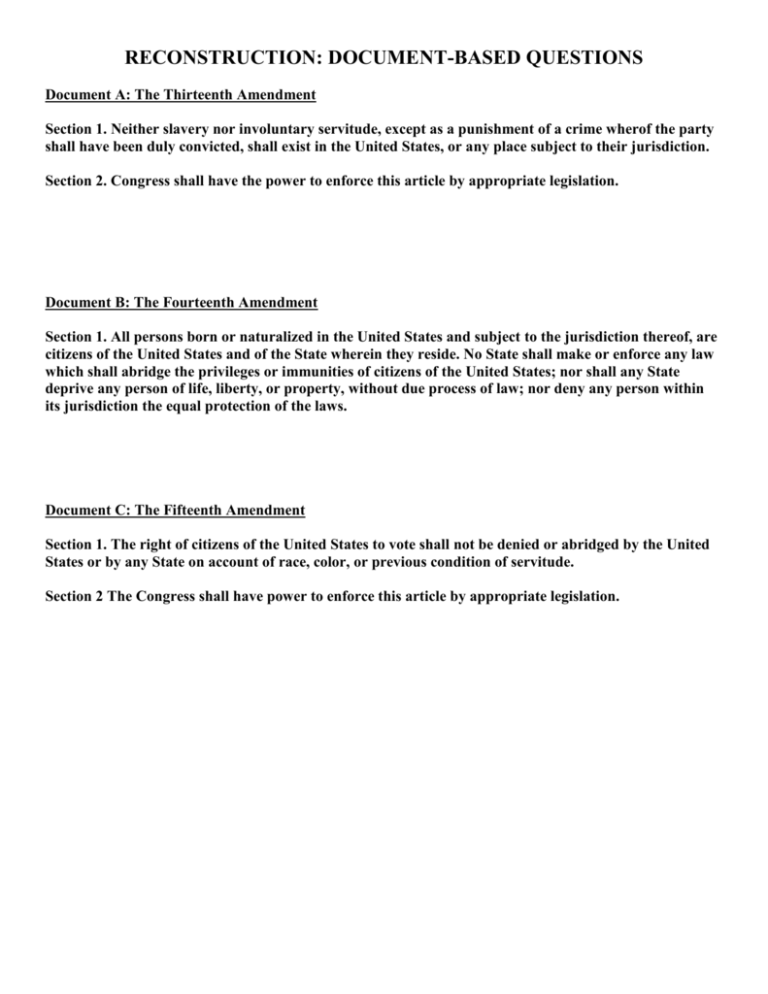
RECONSTRUCTION: DOCUMENT-BASED QUESTIONS Document A: The Thirteenth Amendment Section 1. Neither slavery nor involuntary servitude, except as a punishment of a crime wherof the party shall have been duly convicted, shall exist in the United States, or any place subject to their jurisdiction. Section 2. Congress shall have the power to enforce this article by appropriate legislation. Document B: The Fourteenth Amendment Section 1. All persons born or naturalized in the United States and subject to the jurisdiction thereof, are citizens of the United States and of the State wherein they reside. No State shall make or enforce any law which shall abridge the privileges or immunities of citizens of the United States; nor shall any State deprive any person of life, liberty, or property, without due process of law; nor deny any person within its jurisdiction the equal protection of the laws. Document C: The Fifteenth Amendment Section 1. The right of citizens of the United States to vote shall not be denied or abridged by the United States or by any State on account of race, color, or previous condition of servitude. Section 2 The Congress shall have power to enforce this article by appropriate legislation. Document D: "The Freedman's Bureau" political cartoon "THE FREEDMAN'S BUREAU! AN AGENCY TO KEEP THE NEGRO IN IDLENESS AT THE EXPENSE OF THE WHITE MAN. TWICE VETOED BY THE PRESIDENT, AND MADE A LAW BY CONGRESS. SUPPORT CONGRESS & YOU SUPPORT THE NEGRO. SUSTAIN THE PRESIDENT & YOU PROTECT THE WHITE MAN." "One in a series of racist posters attacking Radical Republicans on the issue of black suffrage, issued during the Pennsylvania gubernatorial election of 1866. The series advocates the election of Hiester Clymer, who ran for governor on a white-supremacy platform, supporting President Andrew Johnson's Reconstruction policies. In this poster a black man lounges idly in the foreground as one white man ploughs his field and another chops wood. Accompanying labels are: 'In the sweat of thy face shalt thou eat thy bread,' and 'The white man must work to keep his children and pay his taxes.'" -- Harper’s Weekly Document E: "Worse than Slavery" Document F: Protest of the Freedmen of Edisto Island, SC to General Howard, October 1865 Note: This document is in the original spelling in which it was written. General we want Homesteads (lands to live and settle on); we were promised homesteads by the government; If It does not carry out the promises Its agents made to us, If the government Haveing concluded to befriend Its late enemies and to neglect to observe the principles of common faith between Its self and us Its allies In the war you said was over, now takes away from them all right to the soil they stand upon save such as they can get by again working for your late and thier all time enemies - If the government does so we are left In a more unpleasant condition than our former. we are at the mercy of those who are combined to prevent us from getting land enough to lay our Fathers bones upon. We Have property In Horses, cattle, carriages, & articles of furniture, but we are landless and Homeless, from the Homes we Have lived In In the past we can only do one of three things Step Into the public road or the sea or remain on them working as In former time and subject to their will as then. We can not resist It In any way without being driven out Homeless upon the road. You will see this Is not the condition of really freemen. In behalf of the people Committee: Henry Bram, Ishmael Moultrie, Yates Sampson Document G: John McCoy Interview Document H: W.E.B. DuBois, Black Reconstruction in America "But the decisive influence was the systematic and overwhelming economic pressure. Negroes who wanted work must not dabble in politics. Negroes who wanted to increase their income must not agitate the Negro problem. . . in order to earn a living, the American Negro was compelled to give up his political power." -- Dr. W.E.B. DuBois, Black Reconstruction in America, Document I: Sharecropping "Sharecropping was very distinctive to the South after the Civil War until the 1940s. As late as 1936, about 60 percent of plantations were organized into sharecropper units." --Ingolf Vogeler Document J: Overview of Reconstruction Document K: White Resistance Source: Abram Colby, testimony to a joint House and Senate Committee in 1872. (Colby was a former slave who was elected to the Georgia State legislature during Reconstruction.) Colby: On the 29th of October 1869, [the Klansmen] broke my door open, took me out of bed, took me to the woods and whipped me three hours or more and left me for dead. They said to me, "Do you think you will ever vote another damned Radical ticket?" I said, "If there was an election tomorrow, I would vote the Radical ticket." They set in and whipped me a thousand licks more, with sticks and straps that had buckles on the ends of them. Question: What is the character of those men who were engaged in whipping you? Colby: Some are first-class men in our town. One is a lawyer, one a doctor, and some are farmers… They said I had voted for Grant and had carried the Negroes against them. About two days before they whipped me they offered me $5,000 to go with them and said they would pay me $2,500 in cash if I would let another man go to the legislature in my place. I told them that I would not do it if they would give me all the county was worth… No man can make a free speech in my county. I do not believe it can be done anywhere in Georgia. Source: Harper’s Weekly, October 21, 1876. Caption: “Of Course he wants to vote the Democratic ticket.” Document L: Election of 1876 ...the slave went free; stood a brief moment in the sun; then moved back again toward slavery. Dubois -W.E.B. 1876 was an exciting year for America. It was the 100th anniversary of The Declaration of Independence and America was on the move. Homesteaders and ranchers were filling up the land west of the Mississippi River. Railroads were being built at an astounding rate. It seemed the United States was creating enough opportunity that all Americans and millions of immigrants could pursue their hopes for happiness just as Thomas Jefferson had envisioned 100 years earlier. So it is a great irony of history that the election of 1876 officially crushed the American dream for millions of black Americans. This election saw Rutherford B. Hayes, the Republican candidate and eventual winner, square off against Samuel J. Tilden, the Democratic nominee. Although Tilden won the popular vote by a wide margin, election results in Florida, South Carolina, and Louisiana were so close that a winner could not be determined. If these three states went for Hayes, he would win the Electoral College vote and become President. Talk of a new Civil War was in the air as the opponents in the disputed states submitted separate sets of electoral ballots. An informal agreement, now called The Compromise of 1877, avoided the crisis by granting Hayes the Presidency. In return, Hayes promised to remove the last Federal soldiers from the South, almost guaranteeing that all-white governments would rise to power. The dream of Reconstruction was officially dead. For a while, however, it had seemed that the dream of Reconstruction might be realized. The 13th Amendment ended slavery. The 14th Amendment gave black Americans citizenship and civil rights. A Military Reconstruction Act was passed to make sure African-Americans' new rights were protected. Black churches were founded. Public schools were built for black children, and universities like Howard, Fisk, Morehouse, and Hampton were founded for black students seeking higher education. Sixteen African-Americans were elected to Congress and numerous others served at state and local levels. Finally, the 15th Amendment was ratified making it illegal to deny someone the right to vote based on race. Indeed, real progress was made. However, in the early 1870s, the tide shifted. Southern states began to elect governments dedicated to whites-only rule. Between 1870 and 1876 all but three Southern states turned back Reconstruction efforts. When Rutherford B. Hayes agreed to remove federal soldiers, he was simply putting an end to an already dying effort. But dying or dead, what had gone wrong? North or South: Who killed Reconstruction? Election results: Popular vote (7 Nov 1876) Rutherford B. Hayes (Republican) 4,034,311 Samuel J. Tilden (Democratic) 4,288,546 Peter Cooper (Greenback) 75,973 other 14,271 Candidate (party) Electoral vote (6 Dec 1876) 1852 184 0 0 Document M: Black Codes Source: In the years following the Civil War - throughout the South -state, city, and town governments passed laws to restrict the rights of free African-American men and women. These laws were often called “Black Codes.” The example below of “Black Codes” comes from laws passed in Opelousas, Louisiana immediately after the Civil War. 1. "No negro or freedmen shall be allowed to come within the limits of the town of Opelousas without special permission from his employers. Whoever breaks this law will go to jail and work for two days on the public streets, or pay a fine of five dollars.” 2. “No negro or freedman shall be permitted to rent or keep a house in town under any circumstances. No negro or freedman shall live within the town who does not work for some white person or former owner.” 3. “No public meetings of negroes or freedmen shall be allowed within the town.” 4. “No freedman shall be allowed to carry firearms, or any kind of weapons. No freedman shall sell or exchange any article of merchandise within the limits of Opelousas without permission in writing from his employer.” 5. “Every negro is to be in the service of (work for) some white person, or former owner.” Document N: The End of Reconstruction Source: Gerald Danzer et al., The Americans, McDougall Littell, 1998. ...in the 1870s, Northern voters grew indifferent to events in the South. Weary of the 'Negro Question' and 'sick of carpet-bag' government, many Northern voters shifted their attention to such national concerns as the Panic of 1873 and corruption in Grant's administration....Although political violence continued in the South... the tide of public opinion in the North began to turn against Reconstruction policies. Source: Kenneth Stampp, The Era of Reconstruction, 1865-1877, Vintage, 1967. Meanwhile southern Democrats gained strength when Congress finally removed the political disabilities from most of the prewar leadership. In May 1872, because of pressure from the Liberal Republican, Congress passed a general amnesty act which restored the right of office holding [and voting] to the vast majority of those who had been disqualified…After the passage of this act only a few hundred ex-Confederates remained unpardoned. Document O: African-Americans in Politics Source: Heather Cox Richardson, The Death of Reconstruction: Race, Labor and Politics in the PostCivil War North, 1865-1901. Harvard University Press, Cambridge, Massachusetts, 2001. In the fall of 1873, even the staunchly (firmly) pro-Grant and pro-freedman Boston Evening Transcript ran a letter ... arguing that "the blacks, as a people, are unfitted for the proper exercise of political duties.... The rising generation of ...blacks needed a period of probation and instruction; a period ... long enough for the black to have forgotten something of his condition as a slave and learned much of the true method of gaining honorable subsistence and of performing the duties of any position to which he might aspire. Northern artist’s portrayal of the South Carolina State Legislature during Reconstruction. Source: The Cover of Harper’s Weekly, March 14, 1874 Document P: Judge J.H. Yarborough Recalls the End of the Civil War James Henry Yarborough was a Probate Judge in Chester County, South Carolina, when we was interviewed by a WPA Federal Writer's Project writer. Much of that interview dealt with his experiences as a young man in the period after the Civil War. "I was a tousled-head boy when the Yankees reached Jenkinsville and our old home, after crossing at Freshley's Ferry on Broad River. The invading army confiscated everything, such as corn, wheat, oats, peas, fodder, hay, and all smokehouse supplies. My recollection is that they came in February, 1865. I was then a freckled-face boy nine years old, and I fought like fury to retain about a pack of corn-on-the-cob that the Yankee's horses had left in a trough unconsumed. "I remember, too, how grief stricken I was when a Yankee soldier killed my little pet dog. He had a gun with a bayonet fixed on the muzzle. He began teasing me about the corn. The little dog ran between my legs and growled and barked at the soldiers whereupon with an oath the soldier unfeelingly ran the bayonet through the neck of the faithful little dog and killed him. "When that cruel war was over, it would have been wiser had the whites and ex-slaves been left to their own resources and inventions, to work out their future welfare. There was no lack of affection or loyalty on the part of the Negro, nor was there a lack of love and an enlightened appreciation of self-interest upon the part of the whites. Things might have been different if suffrage had been granted gradually. But with immediate equal suffrage, or the right to vote, came the carpetbagger with his preachments of social equality and the tantalizing bag of tricks to get for every Negro 40 acres of land and a mule. The Negroes were credulous and believed all the absurdities the knaves told them. The result was an inevitable curse for the Negro and lots of trouble for the white people. It ended only when Hampton was elected in 1876. Hampton is still my hero and a man of greatest worth in the annals of South Carolina." Document Q: George Ogden Recalls Reconstruction in the South George Ogden was born in Iowa before the Civil War. After the war, he traveled widely, picking up odd jobs in a number of places. Eventually, he moved to McLennan County, Texas. "I was born in the year 1852 in the state of Iowa. I was 13 years old when the war between the states closed. At the age of 18 years I left my home in Iowa and came south to the state of Mississippi.. Two years later came to Texas where I have resided with the exception of 12 years which I spent in Mexico. . . . ". . . Once again I experienced a thrill as the war torn city of historical fame [Vicksburg, Mississippi] it seemed, held out its hand in welcome to a son of the North. So after many years I came and fell a victim to its charms, as well as a victim to the entire South. My first impression of awe after seeing the canon were for the old mansions of the city. [H]ere the belles and the beaus trod the dances with its high ceilings and the stately halls. Then the next thing were the plantations as they stood in the days of ante-bellum. . . . "The other most impressive thing to me were the "quarters" where the slaves had lived before the Civil War , they were still as they were then and the oldest slaves were still living with their "white folks" as their master with his family was called. These cabins were some distance back of the master's house and while still in use, were old and showed they had been built in another day. They were all alike, two rooms with a chimney rising at one and of the cabin. . . . "At this time the negroes had been giving trouble altho the Reconstruction days were about over, they still were undecided as to their rights. The Freedmans Bureau had been withdrawn and the white man was again assuming control. I found many plantations which had once been prosporus not run down and in a forsaken condition, in some instances due to the fact that the owner did not return from the war and in others due to the fact that the losses incurred as a result of the war had made it impossible for the owner to regain his financial status. "These communities still mobbed a negro if he still committed an offense they thought justified taking the law into their own hands. At the time I worked in Pine Bluff the white man and the negro did not work together in the fields or else where, always in separate crowds. At first this struck me as odd, but in time I assumed the same attitude as the southern man towards the negro, with this exception, that I could not understand the southern mans attitude of responsibility towards their former slaves. If the slave tried to do right the former owner gave him a crop and furnished him his supplies, gave him part of the crop he made and saw that he was taken care of, just as if there had been no war with the slavery question involved. But he knew how to handle the situation it seemed." Document R: The Goodings Describe Reconstruction in South Carolina Mrs. Ella Gooding (aged 80) and her husband Robert (aged 82) lived in Winnsboro, South Carolina, when they were interviewed by the WPA Federal Writers Project. Mrs Gooding had been born near Winnsboro; her husband had been born in Kentucky and had moved to South Carolina after the Civil War. Mr. Gooding: "I was born in the State of Kentucky, October 20, 1855, but my father, A. F. Gooding, and my mother with the family, moved to Polk County, Missouri, when I was but a child. My father joined the Confederate Army, although we were living in a state that didn't go with the seceded states. "Yankees came often to our house in search for father, and they showed mother the tree on which they proposed to hang him if he was ever caught by them. They took off all our slaves without our leave, for which we never received any compensation. Mother decided to take the family, consisting of my two young brothers, Sterling and Charles, my sister, Bell, and myself back to the old home in Kentucky. "After the war in 1869, father moved us to Winnsboro. . . . "The military rule in Winnsboro was not oppressive; however, it was distasteful to have a Negro company of U. S. troops located here. There was no marauding, no insolence, although they were stationed here six months on Mt. Zion campus. They were transferred later and white soldiers sent in their stead. Their barracks were in the Presbyterian woods in the southern part of the town. I remember there were a good many Germans in this company who couldn't speak English to amount to much. "The Ku Klux Klan was a necessary organization and did much to discharge [discourage?] weak white men and ignorant Negroes from lowliness. When the Ku Klux Klan wished to get rid of an undesirable white man or Negro, they would put an empty coffin at the undesirable person's front door. It usually caused the warned one to disappear. Although not a Ku Klux, one night I witnessed a parade of white-sheeted riders and recognized my own horse in the parade. In the morning my horse was in his stable, as usual. I asked no questions about the occurrence until years afterward. . . . "After the Civil War, our people had no money. We became a one-crop people. Cotton was ready money. Northern manufacturers and western farmers encouraged this, and we were without scientific knowledge. Speculators manipulated all the profit out of cotton by a system of exchanges, grades, and quotations. A system of credit was inaugurated by the State Lien Law. By this system the farmer paid tribute to the local Caesar, twenty-five to fifty times the price for plantation supplies." Document S: Throwing Off the Yoke of Carpetbag Government Mrs. Jennie Isabel Coleman was 81 years old when interviewed by the WPA. She was a widow and in the words of the WPA interviewer "of high social connection." She obviously took pride in her community and in the "progressive" bent of her ancestors. "Our section was a long distance from a railroad; in fact, the extreme northern portion was called 'the dark corner.' Strange men would come in Ku Klux times, find a safe retreat, accept hospitality for awhile, and then leave. The women and older children would surmise that these men were Ku Klux members in hiding, and our romantic fancies would surmise their deeds, hair-breath escapes, and romances. But we really never learned anything - so reticent were our parents and elders on the subject. "Our section yielded to none in its ardent support of the Red Shirt movement that elected Wade Hampton governor. The hate of oppression and the love of independence united these people to throw off the yoke of carpetbag government. The casuist may see a crime in the acts of fraud at the Feasterville box in 1876, but our people realized that a condition, not a theory, confronted them. Half our votes had been left on the battlefields of our country, we were already the political serfs of our former slaves. And if things kept on as they were, we would become their industrial servants also. We feared that the scum of the North's disbanded army, not content with political supremacy and ownership of lands and property, would come down South and demand social equality, and that the South, held down by Federal bayonets, would have to submit and live among its horrors or seek asylums and homes in other parts of the world." Document T: Representative Thaddeus Stevens of Pennsylvania, 1865, on the Radical Republican program for Reconstruction We hold it to be the duty of the government to inflict condign punishment on the rebel belligerents, and so weaken their hands that they can never again endanger the Union; and so reform their municipal institutions as to make them republican in spirit as well as in name.... We propose to confiscate all the estate of every rebel belligerent whose estate was worth $l0,000 or whose land exceeded two hundred acres in quantity....By thus forfeiting the estates of the leading rebels, the Government would have 394,000,000 of acres....Give if you please forty acres to each adult male freedman. Suppose there are one million of them. That would require 40,000,000 of acres.... The whole fabric of southern society must be changed....How can republican institutions, free schools, free churches, free social intercourse exist in a mingled community of nabobs and serfs; of the owners of twenty thousand acre manors with lordly palaces, and the occupants of narrow huts inhabited by "low white trash?".... The property of the rebels shall pay our national debt, and indemnify freedmen and loyal sufferers. Document U: First Reconstruction Act & Johnson’s Response Be it enacted, That said rebel States shall be divided into military districts and made subject to the military authority of the United States...That it shall be the duty of each officer...to protect all persons in their rights of persons and property, to suppress insurrection, disorder, and violence, or cause to be punished, all disturbers of the public peace and criminals.... First Reconstruction Act, 1867, the radical program The power...given to the commanding officer over all the people of each district is that of an absolute monarch. His mere will is to take the place of all law....It reduces the whole population of the ten states-all persons, of every color, sex, and condition, and every stranger within their limits--to the most abject and degrading slavery. President Johnson's veto of the radical program



